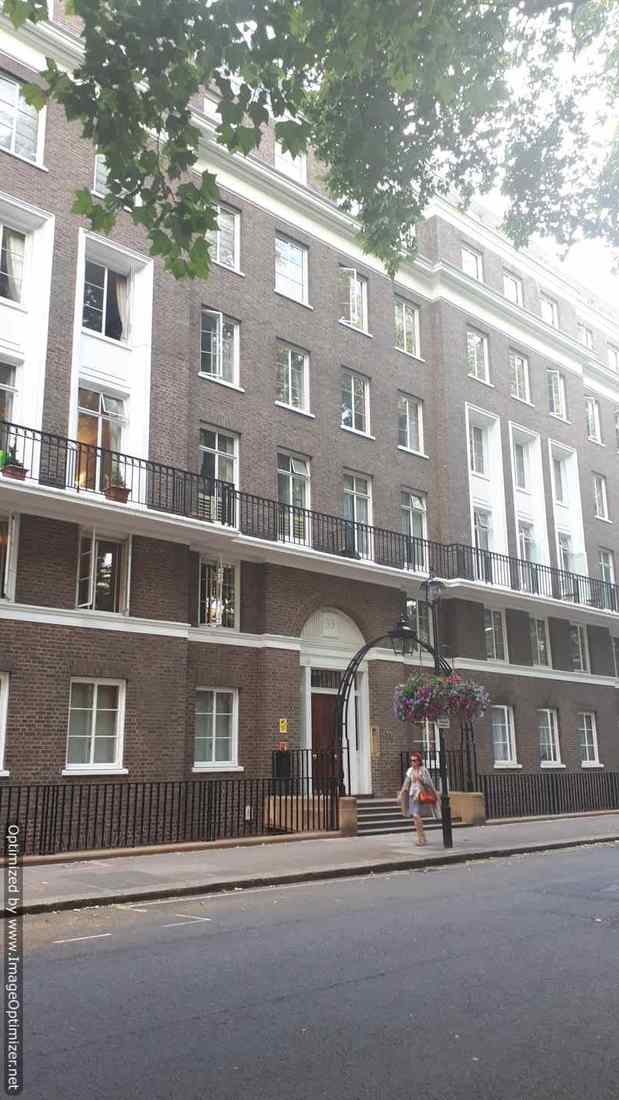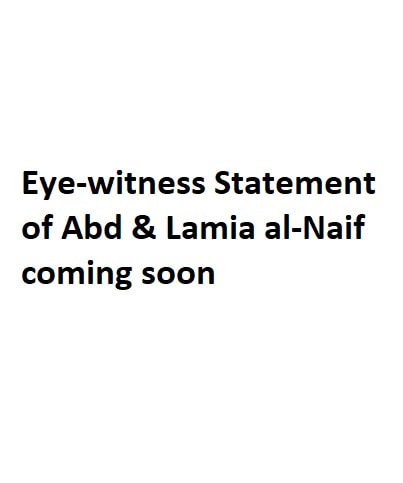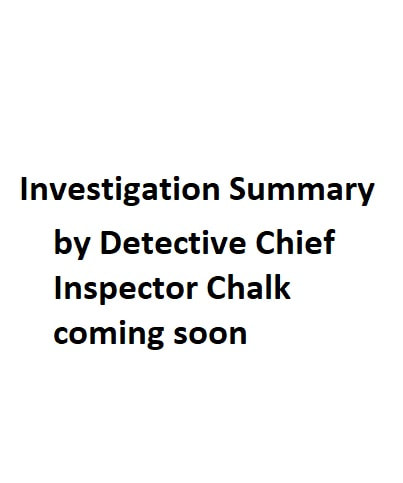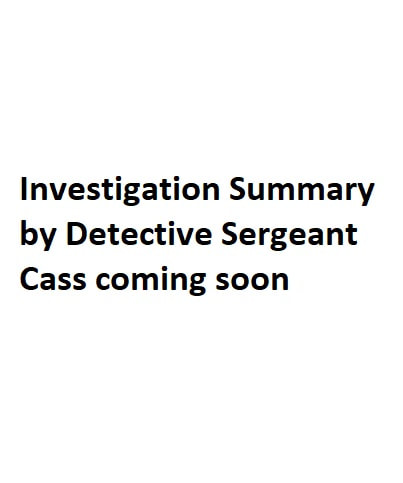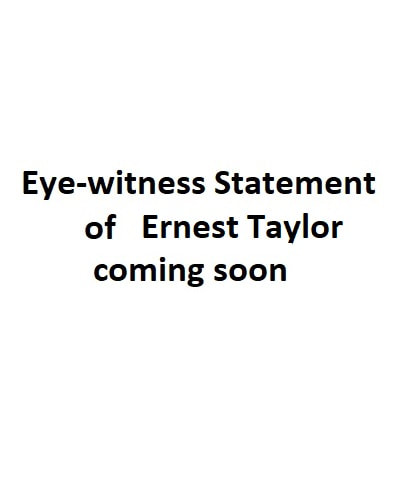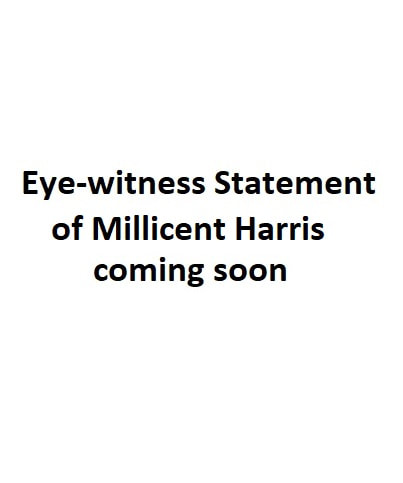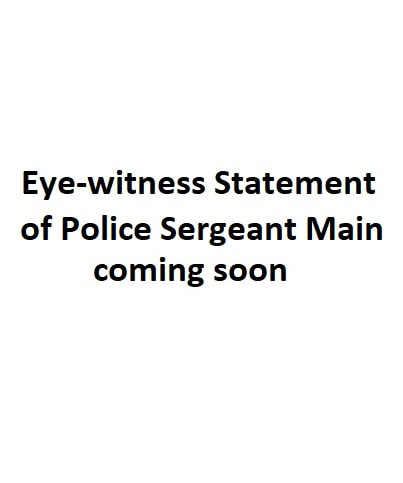|
Nominated BEST TRUE-CRIME PODCAST at British Podcast Awards 2018. Subscribe via iTunes, Podcast Addict, Podbean, Stitcher, Tune-In, Otto Radio, Spotify or Acast.
EPISODE THIRTY-FIVE
On Thursday 18th February 1972, outside of flat 21 at 35 Bryanston Square in London's West End, a group of hired killers attempted to murder the exiled Iraqi General Abd ar-Razzaq Said al-Naif. Four men escaped, one was accused, but no-one was found guilty. So what happened?
CLICK HERE to download the Murder Mile podcast via iTunes and to receive the latest episodes, click "subscribe". You can listen to it now by clicking the PLAY button on the embedded media player below. For transcripts of each episode? Click "Podcast Transcripts".
THE LOCATION
As many photos of the case are copyright protected by greedy news organisations (and I don't want to be billed £300 for copyright infringement again), to view them, take a peek at my entirely legal social media accounts - Facebook, Twitter or Instagram
ARCHIVAL RESEARCH
This podcast was researched using the original declassified investigation files, as conducted by the Metropolitan Police, evidence which was used in the trial at the Old Bailey. This includes a chronology of the events, a detailed back-history of the events, as well as many victim and eye-witness statements by the following people, taken immediately after the attempted assassination:
Note: owing to Covid-19, London is in a tier 4 lockdown, therefore I am currentlty unable to make photographic copies of these statements and summaries, but they will be uploaded, in full, and will be used as per Government licence 3.0, proving the authenticity of the events depicted.
What follows are extracts from British newspapers The Guardian, The Birmingham Post and the Mirror who attended the trial, as held at the Old Bailey and reported on the trial as it unfolded.
Mr Worsley said that the question for the jury was whether Mr Qassim was one of the four men, or whether he was an innocent bystander, an unwilling spectator. Mr Worsley said it was not suggested that Mr Qassim held a gun, or had bullets. He said that when the general saw the would-be assassins he ran to another part of his home. His wife came out of the kitchen into the firing line and was wounded. Mr Worsley said the general led a bloodless coup on July 17 1968, but two weeks after becoming prime minister he was arrested at the president’s house. He was later appointed ambassador to Geneva but left there for security for himself and his family. He changed their passports and moved to Germany, coming to London on September 12th 1969and moving into the flat. Mr Worsley said Mr Qassim asked the general about his movements. He was obviously trying to find a place where the general would be assassinated, said Mr Worsley. Mr Qassim told the general he had something important to discuss with him and although the general did not want to see him, agreed to do so. Mr Worsley said the general would say he opened the door to his flat and saw the defendant take one step from the lift and stop. He gave no kind of greeting or signal. Two men jumped from the lift with pistols and started firing at the general. He shut the door but his wife passed in front of the door and was shot in the right shoulder. She cried “my husband is killed” and the men ran away. Mr Taylor, the caretaker said he saw three men who looked young and looked Arabian. They started to run up the stairs towards him and he asked what they were doing. Mr Worsley said that they had been part of the way down to the basement and one of them had disposed of a weapon. A policeman with a dog later found a Browning automatic pistol, which was cocked and loaded, a magazine containing bullets and a black mask. When Police Sergeant Main arrived, he saw Qassim standing very calm and still. Asked what he was doing, he merely shrugged. Detective Sergeant Cass went up to the general’s flat and saw his wife. Mr Worsley said that when he was seen at Paddington Station by Detective Chief Inspector Chalk, Mr Qassim said “this was political and nothing to do with me”. He said he heard the General’s wife shouting that her husband was dead, so he left. When told that the general had not in fact been killed, Mr Qassim became very excited and screamed in a language the officer could not understand. When he calmed down, he was asked what was the matter and replied “you wouldn’t understand. This is terrible. I am a dead man”. The trial continues.
The general said that since his arrival in London he had been careful to see whom he opened his door to. “There were very few people I trusted”, he said.
He said he first saw Mr Qassim in London in 1970, when he was introduced to him at another flat. Thereafter he had met Mr Qassim by appointment fairly regularly. The general said Mr Qassim had asked him for a job and on the day before the shooting had phoned him saying he had an urgent matter to discuss. The general said a meeting was arranged and on February 18 the bell outside of the building rang and Mr Qassim announced over the security phone to the flat that he was alone. But when the lift arrived, the two gunmen were on each side of Mr Qassim. Cross-examined by Mr John Hazan QC, defending, the general said he feared that agents of the Ba’athist party might try to kill him. He had been sentenced to death in his absence. Mrs al-Naif told the court that when she had been shot she cried out in Arabic “my husband is killed” and the men left. About five minutes later Mr Qassim phoned and asked her what had happened? She told him “you killed me and you killed my husband”. Mr Qassim said in evidence that he had nothing to do with the shooting and that when he arrived in the building a woman was getting into the lift followed by three men whom he had never seen before. He said that when he got out of the lift the general smiled and said something in “a low voice” and the shut the flat door. Then the shooting started. He continued “after the shooting had started I went back to the wall by the lift. The firing seemed to come from the left and behind. I said “please I am just a guest” in English. After the shooting stopped, they fled. “I then knocked on the door of General al-Naif and asked in Arabic whether anyone was hurt, but I heard nothing at first. Later I heard people talking to each other. He said he asked the caretaker to call the police and the caretaker said they were already coming. “I never tried to run away” he said “I had nothing to fear”. Cross-examined by Mr Michael Worsley, Mr Qassim said that he had arranged to meet the general because he wanted to say goodbye to him before he left for America on a business trip”.
The shots missed him and wounded his wife in the shoulder. Mr Worsley said that it was not suggested that Mr Qassim fired any shots, or that he had any pistols or ammunition on him, but that he was party to the attempted assassination. Mr Worsley said that the general led a bloodless coup in Iraq un July 1968. Two weeks after becoming Prime Minister, he himself was arrested at the President’s house. After being sent to Morocco, he eventually went to live in London in September 1969, moving into the block of flats in Bryanston Square.
According to Mr Qassim, the general had been condemned to death in his absence by the regime if the day in Iraq, the Ba’athist Party. Mr Qassim said in evidence that he had no quarrel with the general who as a good friend. Mr Qassim said he hated the Ba’athist Party as mucha s the party hated him. He had no motive to kill the general. The jury was out for two and a half hours considering its verdict.
Transcript: THE MIRROR – 28th June 1972, titled Can You Tell An Assassin By His Face?
How do you recognise a potential assassin? This was the question a judge put to an Old Bailey jury yesterday. It came at the end of the trial of a writer accused of attempted murder. And Mr Justice Bean went on to say that there was no way of telling a would-be-killer by his appearance. Referring to the defence’s statement that the accused, Iraqi Yahya Qassim did not look like an assassin, the judge said “I wonder how many assassins you have met in your time. How many of you woud have recognised as killers many of the more infamous assassins?”
Qassim, 56, of Hyde Park Place, Bayswater, who is also a lawyer was found not guilty of attempting to murder Genral Abdul Razzak Al-Naif, 38, a former Prime Minister of Iraq. He was also acquitted of wounding the general’s wife Lania and unlawfully possessing two pistols with intend to endanger life. The prosecution said that four men including Qassim went to the general’s flat in Bryanston Square on February 18 and tried to kill him. They opened fire but missed the general. His wife was wounded in the shoulder. The prosecution said that it was not suggested that Qassim had fired any shots but that he was party to the attempted murder. Yesterday the judge said that Qassim had described the general, who led a short-lived coup in Iraq, as a friend whom he loved. But in cross-examination, he had accused him of being a “torturer, a murderer and a rapist”. And he said the general had been condemned to death in his absence. The story was set against a background of Iraqi politics, said the judge. “That is a country where it seems, when you are up you are up and when you are down you are in danger”. The judge added “in the web of intrigue that concerns Iraqi affairs, you would lose your way in a search for a motive”. He said that the general who had been Iraq’s director of intelligence for five years “could not have failed to make enemies”. The jury were out for two and a half hours before returning their verdict.
Other articles used included:
Transcript of Episode 35: The Several Assassination of the Exiled Iraqi.
(Judge’s gavel) “Order! Order!” From the 15th to the 28th June 1972, a trial was held at The Old Bailey before the Judge, Mr Justice Bean. The crime? The attempted assassination of the former Iraqi Prime Minister General Abd al-Naif and the wounding of his wife, Lamia. The evidence stated that three men had entered the lift, arrived at the sixth floor and exited at the same time that the shots were fired. Two of the men were disguised and brandishing guns, the other was unarmed and casually dressed. With the unidentified gunmen having fled, remaining behind, a third man was arrested and tried with the “attempted shooting of ex-prime minister General al-Naif”. But if he was an assassin or co-conspirator, he was certainly an unlikely choice. The accused was Yahya Qassim, a fellow Iraqi and a respected writer and lawyer, who was a recent friend and business acquaintance to the general. The trial was unusual, as with the prosecution stating “there was no suggestion that Mr Qassim fired any shots, or that he had any pistols or ammunition on him, but that he was party to the attempted assassination”, leaving the judge to ask “how do you recognise an assassin?” and the jury with a very unusual quandary; to decide if Mr Qassim “was one of the three men... or whether he was an innocent bystander”? What follows is a dramatization of the events based on the declassified police investigation files and the eye-witness testimony of those who were there that day. SCRIPT: Welcome to Murder Mile; a true-crime podcast and audio guided walk featuring many of London’s untold, unsolved and long-forgotten murders, set within one square mile of the West End. Today’s episode is about Abd ar-Razzaq Said al-Naif (Abd ar-Razzak Sayheed al-Nay-eef); an exiled Iraqi national, living in the West End, who found himself the target of several assassinations. And yet, as high up as the orders to have him killed came, his death may have been left in the hands of a most unlikely man. Murder Mile contains grisly details which may disturb any delicate poppets, as well as realistic sounds, so that no matter where you listen to this podcast, you’ll feel like you’re actually there. My name is Michael, I am your tour-guide and this is Murder Mile. Episode 35: The Several Assassinations of the Exiled Iraqi. Today I’m standing in Bryanston Square, W1; two streets north of Oxford Street, two streets east of Edgware Road and two tube stops west of Soho. If this sounds familiar, that’s because situated on the north side of the square, at the junction of Wyndham Place and Montagu Place, there once stood an air-raid shelter, where Evelyn Margaret Hamilton became the first victim of The Blackout Ripper. With its private garden surrounded by several seven-story Edwardian mansion houses, so anonymous they can only differentiated by subtle changes in their brown bricks, white windows and black wrought iron gates; this square is so exclusive and yet deliberately discrete; with so many embassies nearby, it’s highly likely that the bin-men are bugged, the street-sweeper’s a secret sniper, each concierge has top secret clearance, the milkman’s been knighted, the homeless are only here by royal appointment, and even a posh poodle doing a doggy poo-doodle on the path is protected by diplomatic immunity. And with me not being an oily oligarch, a Saudi slime-ball, a disgraced duke, or an aristocratic bit of hoity-toity who’s under house-arrest as the judge deemed him too posh for prison; the second I even think of setting foot in their private garden; alarms will wail, flood-lights will flash and six black-suited men with Uzis will hurl me into a holding cell, I’ll be frisked, stripped and water-boarded; tortured, strangled and chopped into a rather fancy pate, as (in their eyes) anyone who doesn’t have a diamond-encrusted Rolex, a Beamer painted by Picasso, an aversion to paying tax, a dubious human rights record and isn’t a regular donor to the Tory party is clearly suspicious. And although this was the home of socialite Wallace Simpson (the American divorcee who caused King Edward VIII to abdicate) and Osmond Barnes, the man who gave the whole of India to Queen Victoria as a gift, it was here, outside Flat 21 of 35 Bryanston Square, that Abd al-Naif, an exiled Iraqi national with a death sentence on his head faced a very unlikely firing squad. (INTERSTITIAL). On Friday 18th February 1972 at a little after 2pm; a sweetly-smiling, smartly-dressed and deeply-caring middle-class Iraqi couple were shopping amongst Edgware Road’s noisy, excitable and chaotic Middle Eastern bustle of shawarma bars, shisha cafes, deli’s, tailors and coffee-houses. Being home to many Arabian immigrants since the late 19th century; regardless of where their roots lay (whether in the Lebanon, Syria, Iran, Iraq, Israel or Egypt), although this half mile stretch of Edgware Road is often dubbed “Little Beirut”, it’s always been a place of peace, safety and anonymity. Being five foot nine inches tall with black wavy hair, thin brown eyes and a lantern jaw, 38 year old Abd was the epitome of an Iraqi businessmen; as dressed in a tailored suit and shiny shoes with a crisp shirt and tie, although he had the heft of a man with a military background, with a thin uneasy grimace about his lips, he had the face of a politician. But by those who knew him, he was widely respected. Side-by-side, Abd walked with 34-year-old Lamya, his beloved wife of sixteen years and mother to their five children (the youngest of which – Ali – they’d dropped off at a local nursery). And although she was an unassuming little lady with long dark hair, beautiful eyes and an intoxicating smile, having followed her husband through thick-and-thin, she was his strength, his confidante and his soul-mate. And as much as they resembled an average middle-class Iraqi couple who’d relocated to London in the early 1970’s, they were anything but, and very few people knew who he truly was. Born in the Iraqi city of Fallujah (43 miles west of Baghdad) on 18th June 1934, Abd ar-Razzaq Said al-Naif was raised in an affluent middle-class family, the second oldest of six siblings, and educated with traditional values, religious upbringing and a passionate patriotism for his country. As a confident, polite and driven young man; aged 16, Abd enrolled in the Iraqi Military Academy. Being eager to rise through the ranks of the Army, after three years of intensive training, Abd was promoted to 2nd Lieutenant, graduated with a degree from the State College of Baghdad and being both a successful soldier and a political thinker, with Iraq being our ally in the years after World War Two, Abd was trained by British intelligence at an undisclosed military base in Uckfield (Sussex). By 1964, Abd was appointed Deputy Head of Iraqi Military Intelligence. By 1965, he was Advisor to the Iraqi President (Abdul Salam Arif). And by 1968, Abd was promoted to General, all by the age of 34. But by 1968, with the Cold War heating up as the US and the USSR battled for supremacy in both the Space Race and the Arms Race, with the government of Iraqi leaning towards Communism, on 17th July 1968, Abd initiated a “bloodless coup”, seized control of the state and appointed General Ahmed Hassan al-Bakr of the Ba’ath Party as President, and himself as the 39th Prime Minister of Iraq. Dubbed “The White Revolution”; this bloodless coup was seen as indicative of the peaceful coalition government Abd had created with al-Bakr as an Arab Socialist and himself as an independent, but after just 15 days as Prime Minister, President al-Bakr and several Ba’ath Party conspirators - one of whom was the future Iraqi President Saddam Hussein – had Abd arrested. Eager to keep-up the pretence of a peaceful transition, al-Bakr had Abd ejected from Iraq, exiled to Rambat and (fearing for his life) was forced to take-up the powerless position as the Iraqi Ambassador to Morocco. One month later, having been shipped-off to Switzerland to act as the Iraqi Minister for Swiss Foreign Affairs, Abd was warned that the Ba’ath Party were plotting to have him killed. As the authorities in Switzerland were unable to offer him protection, with his escape bankrolled by a wealthy Iraqi ally - Sheik Mulalhal Balasim al-Yassin – Abd, Lamya and their five children fled to London on 15th September 1969 and moved into the safety of Flat 21 at 35 Bryanston Square. It was here they hoped to live a normal life, far from al-Bakr, the Ba’ath Party and Iraqi politics. But living in a city surrounded by strangers, with a death sentence hanging over his head, he would never be sure who he could trust when he opened the door... and his faith would soon be tested (INTERSTITIAL). Born in the Iraqi city of Mosul on 10th October 1914, 56-year-old Yahya QASSIM (Yiy-yah Cazim) was bright, erudite and political. In 1934, aged 20, Qassim graduated from Baghdad Law Faculty with a law degree, set-up his own legal practice, and later became Assistant Secretary to the Baghdad Council of Ministers, Legal Adviser to the Iraqi Railway, editor of his own left-wing Arab newspaper - ‘Ash-Sha’b’ and was a fervent opponent of the Ba’arth Party. After the coup d'etat on 14th July 1958, Qassim was arrested by the new Ba’arthist regime and his newspaper was confiscated and ordered to produce the newspaper Al-Gamhouriya, a Baathist newspaper whose editor was a leading Baathist. Seeking a better and safer life for his family, by 1971, as a writer, a lawyer and a married man with two grown-up sons, Qassim lived at 4 Hyde Park Place, a nine-minute walk from Bryanston Square. Abd’s trusted friend - Sheik al-Yassin – the Arab businessman who had bankrolled Abd’s escape, exile and had even financed the education of his five kids, introduced Abd to Qassim one year prior, it was later said that this was regarding the production of a book on the modern history of Iraq. Being a polite and patient man, burdened by a desire to never cause offence, Abd agreed to a brief meeting with Qassim in the safety of Sheikk al-Yassin’s Kensington office, and then they said goodbye. What happened over the next few weeks and months can only be speculated at, as being deeply suspicious of anyone he didn’t trust, living under the constant fear of a death sentence, the General knew that the he was an obvious target for assassins, that the smartest way to lure him out was by using a friend as bait, and he could never be sure if his “friends” had ulterior motives. What follows is based the various eye-witness statements, as used in evidence at The Old Bailey. It started with phone-calls; sometimes weekly, sometimes daily, sometimes nightly, and always on the end of the phone was Qassim, pestering Abd for more meetings to discuss the eventual overthrow of the Ba’ath Party regime and the exiled General’s glorious return to power as the rightful Prime Minister of Iraq. None of which Abd even wanted, but still Qassim droned on, and on, and on. Note: on balance, these phone calls and the following meetings could have been about the book on a history of modern Iraq, therefore Yahya Qassim may (rightfully) have been excited to research and write such a prestigious book, although no such book is ever mentioned in any part of the investigation files or in any of the witness statements. And then came the meetings, endless meetings with a never-ending slew of nameless people, as Qassim waffled on about Abd’s impending rise to power as the leader of an anti-Ba’ath Party revolution, which Qassim had claimed to have already mustered the support of powerful allies - such as the Jordanian Prime Minister, the Shah of Persia, the Iranian Minister for Foreign Affairs and King Feisal of Saudi Arabia – and yet, as much as Abd politely tried to persuade the nervous little lawyer that he had no plans, at all, to re-ignite the Iraqi revolution, to destabilise the Ba’ath party, and that he only cared about his family’s safety, Qassim remained persistent and droned on, and on, and on. A few weeks prior to the assassination plot, Abd had grown deeply suspicious of Qassim’s questioning, as what began as polite pleasantries before a tedious barrage of business talk, soon felt more like he was deliberately fishing for information about the minutiae of Abd’s daily routine. Although maybe, Yahya was simply excited to begin writing and researching the book? Early December 1971: Abd received a series of strange and silent calls from public phone-boxes to his home phone, but – on every occasion - the second he’d pick-up, they’d hang-up. Was this a coincidence, or were they connected to the upcoming events? Late December 1971: Abd would later state that Qassim had organised a meeting between Abd and Saddig El Bassam, a (supposedly) high-profile Iraqi merchant and staunch opponent of the Ba’ath Party, and yet, as urgent as their meeting was, very little was said, the details were vague, and the next day, the merchant had vanished. January 1972: Having bumped into Qassim on George Street (a residential road one street south of Bryanston Square), Qassim told Abd of the rumour that he was protected by Persian bodyguards and carried a gun. In a momentary lapse in judgement, being desperate to leave, Abd denied both and opened his jacket to prove it. February 1972: Abd would later state that Qassim had organised yet another urgent meeting, only this time with Aga Jaffar; an Iraqi businessman who Abd had already met, and yet, as pointless as this meeting was, Qassim’s mind wasn’t on business, or politics, or even Iraq. Instead he steered the conversation towards more trivial matters about Abd’s life. As a solid judge of character, Lamya (Abd’s wife) instantly took a dislike to Qassim, and being desperate never to share the same space as such a devious and weasily little man, she asked Abd never to invite him to their home, or if he did, she would need to be elsewhere. That afternoon, as if the city’s decrepit old sewers had been blocked by a steamy stinking cesspool of human waste, a bad smell returned to 35 Bryanston Square. And dressed in a crumpled grey raincoat, a tatty brown suit and a battered grey trilby, Qassim slinked up the stone stairs, hung by the mansion block’s black front door and buzzed the intercom of flat 21. With a crackle of static, Abd answered “hello?”, but with this being the early 1970’s, an era long before video intercoms, this call was strictly audio only, and having no idea who it was, the General let out an audible groan when he heard the nasal whine of “Abd? It’s Qassim”. Abd was too tired for this, too fed-up, too bored and too frustrated. In essence, their conversation broke down like this: Qassim: “Abd? It’s Qassim”, Abd: “Yes?”, Qassim: “We must have a meeting, it’s urgent”, Abd: “About what?”, Qassim: “Things. Come on down, we’ll go to the Portman Hotel, have coffee, tea, my treat”, Abd: “We? Who’s this we?”, Qassim: “We? You? Me? And… some people. You must come”. At which, feeling uncomfortable by the vagueness of the details and with his patience tested, Abd replied “no”. A long silence ensued, and although Abd couldn’t be certain, he swore he heard the scuffle of feet and the mutter of frustrated voices, as Qassim piped up with “come down here then, we can talk here”, as persistent as ever. But even from all the way up on the sixth floor, Aba smelled a rat. “No” Abd replied, “No, I think I won’t, I’m busy, maybe next week, okay?”, but Qassim said nothing. There was another crackle of static, another mutter, another scuffle, followed by a series of stuttering statements as Qassim insisted that what he had to tell Abd was vital, urgent and too secret to be said over an intercom. And knowing that this persistent pest would buzz about his ear like a blood-hungry mosquito – with Lamya (his wife) being out – and with an air of reluctance, Abd invited him up. For an interminably long minute, through the spy-hole of flat 21, Abd hesitantly watched as the needle of the sixth floor lift slowly crept up; from ground floor, to first, to second, to third, then it stopped, then it restarted, to fourth, to fifth, and then (ping) to sixth. Behind his thick wooden door, as the art-deco gates of the lift spread aside, into the hall, Abd spied the solitary shambling mess of Qassim. His wrinkled face grimacing an awkward grin as his wizened old hand knocked on the door, which Abd cautiously (and reluctantly) opened, and – once again - Qassim had invited himself into the flat of the exiled Iraqi Prime Minister, unaware that his presence was rarely (if ever) welcome. For fifteen minutes, they sat, sipped tea and chatted; nothing urgent cropped up, nothing important was discussed, and - once again - Abd denied he has any political plans, any revolutionary ambitions, and simply wanted to live with his family in peace. And with that, Qassim wished him well and left. Having lived in a constant fear of being killed for the last four years, maybe the stress had got the better of him, Abd had thought? Maybe he was seeing threats where there weren’t any? As if the Iraqi Ba’ath Party were going to send an assassin, why would they send Qassim? The idea was ludicrous. (Phone rings) Thursday 17th February 1972 at 7pm, Abd received a phone-call. Qassim: “Abd? It’s Qassim”, Abd: “Yes?”, Qassim: “We must have a meeting, it’s urgent”, Abd: “About what?”, Qassim: “Things”, Abd: “What things?”, Qassim: “Just things… too secret to say over the phone”. And so it was agreed that they’d meet, the next day, at 4pm, in Abd’s flat. (Phone hangs up). On Friday 18th February 1972, at a little after 2pm; a sweetly-smiling, smartly-dressed and deeply-caring middle-class Iraqi couple – known locally as Abd & Lamya – strolled along the chaotic bustle of “Little Beirut” on the Edgware Road; their senses tantalised by the sharp tang of freshly brewed coffee, the fruity waft of shisha pipes and the spitting spice of lamb shawarma, as excitable café owners lured prospective patrons in with the promise of falafel, baklava, kofta, manakeesh, grilled halloumi, fattoush and - a delicacy of Iraq - Masgouf (a slowly cooked carp seasoned with lemon and pickles). And as much as Lamya inhaled those beautiful familiar smells from her homeland, Abd’s eyes and ears were elsewhere. Was it his imagination, or was he being watched, was he being followed, were there a lot of Iraqi men milling about on Edgware Road, or was he seeing threats where there weren’t any? He looked at his watch, it was 3pm, he’d have to head home for his meeting with that irritant Qassim. (Phone rings) Thursday 18th February 1972 at 3:30pm; Qassim: “Abd? It’s Qassim”, Abd: “Yes?”, Qassim: “Our meeting…?”, Abd: “4pm, in my flat, I haven’t forgotten”, and then there was a pause, Qassim: “Hmm, let’s meet on the ground-floor, you come down”, Abd: “Down? Why?”, Qassim: “I’m worried about the lift. What if there’s a power-cut?”, Abd: “There’s no power-cut”, Qassim: “What if it’s broken?”, Abd: “I just used it, it’s not broken”, Qassim: “What if it breaks?”, Abd: “Use the stairs”. And with his patience wearing very thin, Abd said something to the effect of “here, 4pm, be there, or don’t” (phone hangs up). At 3:40pm, Qassim exited 4 Hyde Park Place and took a brisk nine-minute walk over Edgware Road to Bryanston. At ten minutes to four on Friday 18th February 1972, Qassim slinked up the stone stairs, hung by the mansion block’s black front door and buzzed the intercom of flat 21. With a sharp crackle of static, Abd answered “hello?”, Qassim: “Abd? It’s Qassim”, hearing a slight scuffle Abd asked “Are you alone?”, with a nervous stutter Qassim replied “Yes… alone”, and with an electric buzz and a metal thung, the black front door of 35 Bryanston Square opened. As Qassim entered the lift, beside him stood two men, described as of Middle-Eastern appearance, early twenties, wearing raincoats with collars up and hats covering their eyes. Which was most convenient for 72 year old Millicent Harris, resident of flat 8 on the second floor, as with her arms weighted down with shopping bags, one of the nice young men held the door open for her, and – with a sense of good manners, often absent with today’s youth – they let the lady into the lift, as they stood side-by-side; Qassim, Millicent and two highly trained Iraqi assassins, in one hand they held black balaclavas and in the other 9mm Browning revolvers. With all four squeezed into the slightly compact lift, as the mysterious man nearest the panel prodded the button to the sixth floor, Millicent politely asked “second floor please”, but the man ignored her. She asked again “second floor please”, but once again he ignored her, they all did (which was odd as Qassim was fluent in English), so believing these reprobates were either foreign, ignorant or rude, she jabbed at the button herself, and scowled at the naughty men with her most withering look. On the sixth floor, Abd watched as the lift’s needle stalled four floors below. Behind him, busy in her kitchen, Lamya prepared dinner. With Qassim closing in, normally she’d be out, but having finished her chores and with no reason to leave, she stayed, as Abd promised to keep the meeting brief. Suddenly, the needle of the sixth-floor lift restarted, and slowly crept up from second floor, to third, to fourth, to fifth and finally (ping) to sixth, but Abd had no sense of trepidation. Qassim was more of an ass than an assassin and only thing he was likely to kill was time, air and brain-cells. But as the lift’s art-deco gates opened wide and the solitary shambling mess of Qassim stepped out… he froze in fear. There was no awkward grin on Qassim’s wrinkled old face and no wizened old hand knocking on the door. As (unlike ever time prior) the ever-cautious Abd wasn’t peeping through the spy-hole, waiting for the very last second to open his heavy wooden door. Instead, he was standing in front of it. As Qassim exited the lift, with their black balaclavas off and their revolvers not cocked, sensing his immediate danger, Abd bolted backwards and slammed the door shut, as a volley of 9mm shots ripped through the wood. Behind the splintered door of flat 21; amongst the shrill screams and the choking tears, Lamya could be heard sobbing “my husband is killed, my husband is killed”, as the assassins fled, their booted feet thundering down the stairs, but gripped with fear, Qassim simply stood motionless and stared. Hearing the shots, Ernest Taylor, the caretaker of 35 Bryanston Square, bravely attempted to grapple with the fleeing assassins, but with both men being young, fit and swift, they easily dodged passed the elderly gent, dashed into the quiet residential street and disappeared forever. Qassim (always being a bastion of tact) telephoned and calmly asked “Lamya? It’s Qassim, what has happened?” To which (seeing blood pour from a bullet-hole in her body and her husband slumped on the floor) she screamed “you have killed my husband, you have killed me”, and then, he promptly hung up. But the assassins were so inept, that nobody had died. With the door slammed shut and unable to see their target, of those five shots fired; one hit the hall skirting board, one hit the bedroom doorframe, two hit the door, and with all five shots entirely missing Abd - who’s military training had told him to drop to the deck and stay low – one bullet had hit Lamya in the right shoulder. But after just two weeks in hospital, Lamya had made a full recovery. Questioned by the Police Sergeant Main a few moments after the shooting, with Qassim’s demeanour calm, he stated he only wanted to say goodbye to the General before he left for America on a business trip – who he would describe in court as a good friend who he loved, but also as “torturer, a murderer and a rapist” - and that he didn’t have any reason to run as he had nothing to fear. But when he told that the General wasn’t dead, he became excited, screaming in Iraqi and (when asked why) to the Police, he replied “you wouldn’t understand. This is terrible. I am a dead man”. At the trial, Mr Justice Bean stated “in the web of intrigue that concerns Iraqi affairs, you would lose your way in a search for a motive... there was no way of telling a would-be-killer by his appearance”. Even asking the jury “I wonder how many assassins you have met in your time. How many of you would have recognised as killers many of the more infamous assassins?” Yahya Qassim was tried at the Old Bailey on 19th June 1972 and charged with the attempted murder of Abd al-Naif and with intent to cause grievous bodily harm to Lamya al-Naif. He pleaded not guilty to all charges and the jury (unanimously) found him… not guilty. With no gun on his person, no bullets in his pocket, no mask on his face, no fingerprints anywhere at the scene and no witnesses able to confirm whether Qassim had fired (let alone held) a gun, he was found not guilty and walked free. Six years later, on Sunday 9th July 1978, outside of the five-star Intercontinental Hotel on London’s Park Lane, as the exiled Iraqi General hopped in a taxi and headed home to his beloved wife, he was cut down by a hail of bullets, one of which blasted a hole in the back of his head, and he died the very next day. This time, his Iraqi assassins were professionals, and his death sentence having been (reportedly) ordered by the ambitious Vice-President of Iraq, whose name was Saddam Hussein. OUTRO: Ladies and gentlemen, thank you so much for listening to Murder Mile. Don’t forget to stay tuned to Extra Mile after the break, but before that, here’s my recommended podcasts of the week, which are Killafornia Dreaming and Targeted. (PLAY PROMOS) A big thank you goes out to my new Patreon supporters, who get exclusive access to lots of secret and often sexy Murder Mile stuff as well as a personal thank you from me; they are Susie Brace, Lina Cho, Roger M, The Quiet One and Gunga-Dun. With a special well done to the winners of the exclusive Murder Mile stickers, badges and fridge magnets on my latest competition, only available via the Murder Mile True-Crime Podcast Discussion Group on Facebook. Murder Mile was researched, written & performed by myself, with the main musical themes written and performed by Erik Stein & Jon Boux of Cult With No Name. Thank you for listening and sleep well. *** LEGAL DISCLAIMER *** The Murder Mile UK True Crime Podcast has been researched using the original declassified police investigation files, court records, press reports and as many authentic sources as possible including eye-witness testimony, confessions, autopsy reports, first-hand accounts and independent investigation, where possible. But these documents are only as accurate as those recounting them and recording them, therefore mistakes will be made. As stated at the beginning of each episode (and as is clear by the way it is presented) Murder Mile is a 'dramatisation' of the events and not a documentary, therefore a certain amount of dramatic licence, selective characterisation and story-telling (within logical reason and based on extensive research) has been taken. It is not a full representation of the case, the people or the investigation in its entirety, and therefore should not be taken as such. It is also often (for the sake of clarity and drama) presented from a single person's perspective, usually (but not exclusively) the victim's, therefore it will contain a certain level of bias to get across this single perspective, which may not be the overall opinion of those involved or associated. *** LEGAL DISCLAIMER ***
Credits: The Murder Mile true-crime podcast was researched, written and recorded by Michael J Buchanan-Dunne, with the sounds recorded on location (where possible), and the music written and performed by Erik Stein & Jon Boux of Cult With No Name. Additional music was written and performed by various artists, as used under the Creative Common Agreement 4.0. A list of tracks used and the links are listed on the relevant transcript blog here
Michael J Buchanan-Dunne is a writer, crime historian, podcaster and tour-guide who runs Murder Mile Walks, a guided tour of Soho’s most notorious murder cases, hailed as “one of the top ten curious, quirky, unusual and different things to do in London”, nominated "one of the best true-crime podcasts at the British podcast Awards 2018", and featuring 12 murderers, including 3 serial killers, across 15 locations, totaling 75 deaths, over just a one mile walk
2 Comments
Duraid Alnaif
13/1/2019 15:58:27
Very accurate description of events. I am the oldest son of Abd Elrazak Alnaif. On February 18, 1972, Mr. Johnson, the Head Master of Seaford College summoned me and my brother to his house in Petworth, Sussex. His house was on the school campus. I think we were taken there by our house master, Mr Headen. We knew something was wrong and were very scared. As we waited in Mr Headen’s formal living room for probably couple hours, Mr Headen and Mr Johnson appeared with 2 other men, we found out later were special branch officers, and they informed us about what had happened. I still remember the first words that came out of Mr Headen’s words: “everything is ok, your parents are both alive, but there was shooting at your house this evening, your mother was injured but she’s going to be ok”. We both started crying and I kept asking “is my father dead!”
Reply
Murder Mile True-Crime Podcast
9/2/2019 14:04:23
Thank you Duraid for your kind words and for updating me on your story, it's fascinating. I've kept as close as possible to the true events, based on the original police investigation file which has been declassified. It is available in the National Archives, if you wish to view it - http://discovery.nationalarchives.gov.uk/details/r/C11245166
Reply
Your comment will be posted after it is approved.
Leave a Reply. |
AuthorMichael J Buchanan-Dunne is a crime writer, podcaster of Murder Mile UK True Crime and creator of true-crime TV series. Archives
July 2024
Subscribe to the Murder Mile true-crime podcast
Categories
All
Note: This blog contains only licence-free images or photos shot by myself in compliance with UK & EU copyright laws. If any image breaches these laws, blame Google Images.
|

